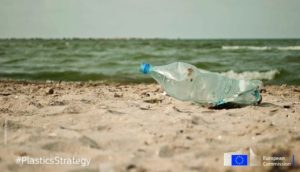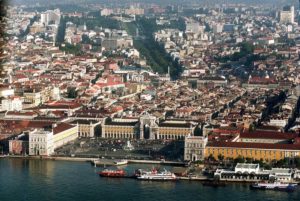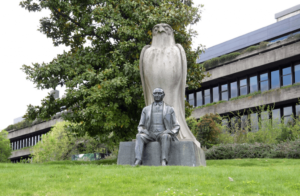85% of all waste found on beaches in the world is plastic.
Disposable cutlery (plastic plates, cups, forks, and knives) should be forbidden in the catering industry if it is up to Portugal’s left-wing parties.
 A draft legislation thereupon was submitted in July 2017 and discussed in Parliament early this year. Heloísa Apolónia – MP of the Ecological and Green Party (PEV) – explains ‘our proposal is to ban the use of plastic disposables in restaurants and bars and to look for biodegradable substitutes within 3 years.’
A draft legislation thereupon was submitted in July 2017 and discussed in Parliament early this year. Heloísa Apolónia – MP of the Ecological and Green Party (PEV) – explains ‘our proposal is to ban the use of plastic disposables in restaurants and bars and to look for biodegradable substitutes within 3 years.’
The director of the Hotel and Restaurant branch organization AHRESP, Jose Manuel Esteves, is not happy with the proposition and has more confidence in recycling. ‘This idea doesn’t make sense at all. If there is one sector that is exemplary for a circular economy, then it is ours. Besides, the main users of disposables are not restaurants but institutions, hospitals, and public festivals.’
 António Fonseca, the president of the Association of Bars in the Historic Center of Porto (ABZHP) – that encourages the legalization of the use of alcohol in public places – believes that the plans are irresponsible in the light of the danger glassware can cause in nightlife.
António Fonseca, the president of the Association of Bars in the Historic Center of Porto (ABZHP) – that encourages the legalization of the use of alcohol in public places – believes that the plans are irresponsible in the light of the danger glassware can cause in nightlife.
The MP of the ruling socialist party (PS) Joao Torres agrees with the proposals but doubts if a timetable of 3 years is realistic. He is more in favor of a ‘gradual implementation to enable the industry to develop sustainable alternatives’. The socialist government has therefore set up a working group and intends to present a bill on the matter in May.

To mobilize the public opinion, the Party for Animals and Nature (PAN) has written an open letter to Al Gore – former US vice-president and author of the documentary Inconvenient Truth – to involve him in their campaign in the social media to reduce plastic cutlery in Portugal (#AlGoreReplytoPan).
‘We have written this letter given his engagement in the pollution of our oceans – where the ‘plastic soup’ has meanwhile reached a size that is equivalent to 17 times the surface of Portugal – declares Andre Silva, MP of PAN. ‘The problem is too big to wait because in 10 to 20 years there will be more plastic than fish in the oceans and microplastics (from cosmetics and cleaning agents) will not only have killed the fish but also entered our bodies via the food chain.’

The non-profit environment organization Quercus recently challenged the Portuguese not to use disposable plastic products for the next 40 days (#40diassemplastico), at least until Easter.
Bom fim de semana Have a great weekend


 ‘This earthquake can be considered as moderately severe’, says Fernando Carrilho, chief seismologist at the IPMA (Portuguese Institute of the Sea and Atmosphere). ‘People shouldn’t worry too much as the southern part of the country has always been seismic active.’
‘This earthquake can be considered as moderately severe’, says Fernando Carrilho, chief seismologist at the IPMA (Portuguese Institute of the Sea and Atmosphere). ‘People shouldn’t worry too much as the southern part of the country has always been seismic active.’ ‘Preventive measures are warranted’, especially in the densely populated areas in the south – like Lisbon and the Algarve – that are most at risk’, says Daniel Oliveira, a civil engineer at the University of Minho. ‘Although a law from 1958 requires earthquake-proof construction, most buildings in the historic capital date from before that time and there is hardly any monitoring of the implementation of the law.’
‘Preventive measures are warranted’, especially in the densely populated areas in the south – like Lisbon and the Algarve – that are most at risk’, says Daniel Oliveira, a civil engineer at the University of Minho. ‘Although a law from 1958 requires earthquake-proof construction, most buildings in the historic capital date from before that time and there is hardly any monitoring of the implementation of the law.’ Over the past 500 years, Portugal has suffered four major earthquakes – in 1531, 1755, 1909 and 1969 – with a magnitude of 6 or more on the Richter scale. The biggest and by far most tragic one was in 1755. With a magnitude of 9 on the Richter scale, it developed apocalyptic proportions and completely wiped out the lower part of the capital. This earthquake (terramoto) inspired poets, influenced philosophers, activated prophets and motivated politicians – like the Marquis of Pombal – to a completely new architectural reconstruction of the Baixa, Lisbon’s city center.
Over the past 500 years, Portugal has suffered four major earthquakes – in 1531, 1755, 1909 and 1969 – with a magnitude of 6 or more on the Richter scale. The biggest and by far most tragic one was in 1755. With a magnitude of 9 on the Richter scale, it developed apocalyptic proportions and completely wiped out the lower part of the capital. This earthquake (terramoto) inspired poets, influenced philosophers, activated prophets and motivated politicians – like the Marquis of Pombal – to a completely new architectural reconstruction of the Baixa, Lisbon’s city center.


 Nowadays, half of the children are born outside marriage and in 20% parents also do not live together, a number that has doubled in the last 6 years.
Nowadays, half of the children are born outside marriage and in 20% parents also do not live together, a number that has doubled in the last 6 years. In parallel to a decline in the number of marriages, there has been an increase in the number of divorces, with Portugal ranking first in Europe. Remarkable is that women have to wait longer than men before they can remarry, ten months instead of six!
In parallel to a decline in the number of marriages, there has been an increase in the number of divorces, with Portugal ranking first in Europe. Remarkable is that women have to wait longer than men before they can remarry, ten months instead of six! Same-sex marriages comprise only 1% of the wedlock but are four times more common in Lisbon and Porto than in the sparsely populated interior. Since 2010 – when gay marriage became legally possible in Portugal – 2300 gay couples have married, two-thirds being men.
Same-sex marriages comprise only 1% of the wedlock but are four times more common in Lisbon and Porto than in the sparsely populated interior. Since 2010 – when gay marriage became legally possible in Portugal – 2300 gay couples have married, two-thirds being men.